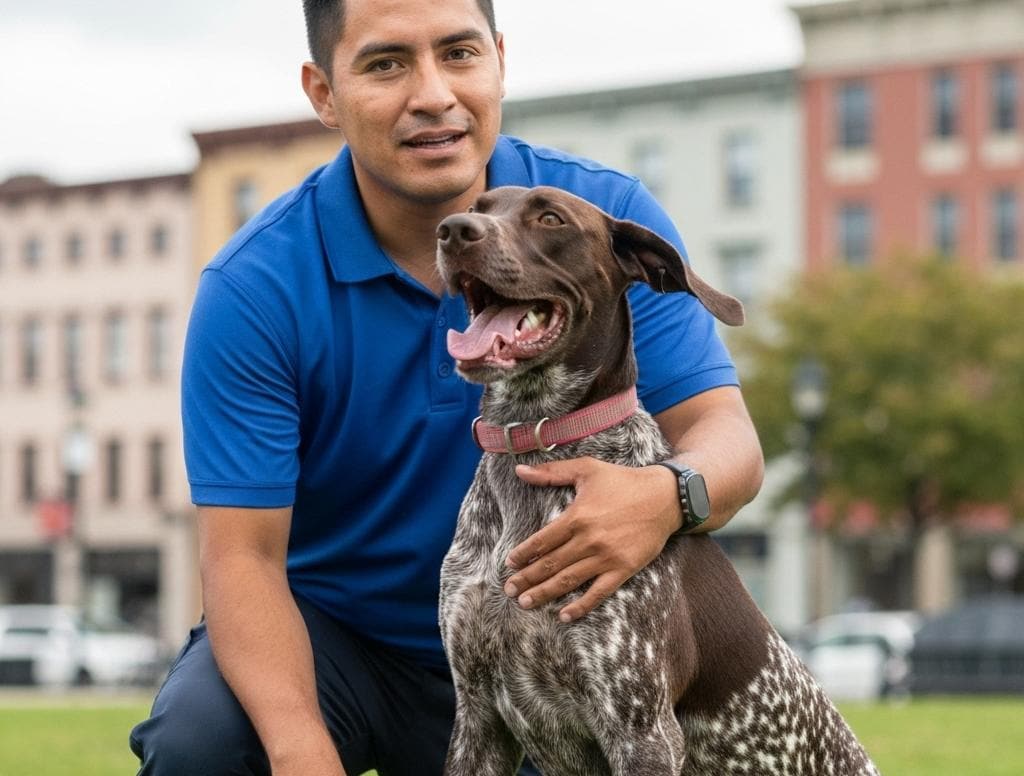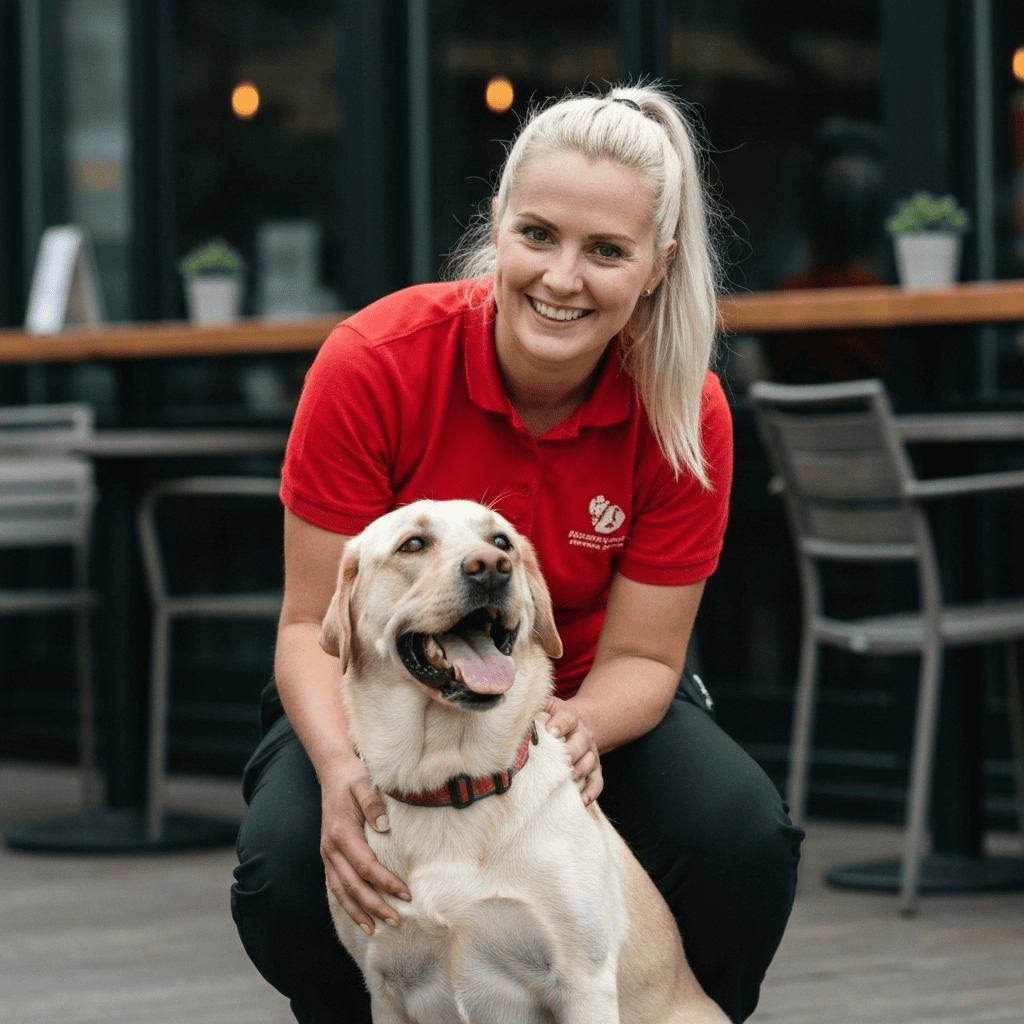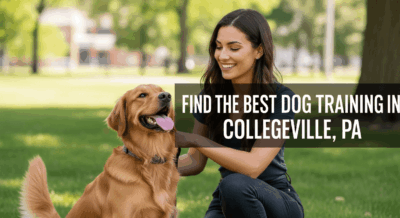Your Complete Guide to Choosing a Dog Trainer in Collegeville
Living in Collegeville means your dog needs to handle everything from busy Main Street sidewalks to weekend crowds on the Perkiomen Trail. Finding the right trainer here isn’t just about teaching basic commands – it’s about preparing your dog for real life in our tight-knit borough and the greater Montgomery County area.
Whether you’re dealing with a new puppy who needs to learn the ropes or an older dog with some behavioral challenges, the key is finding someone who understands both dogs and our local community. Let me walk you through what actually matters when you’re choosing a trainer in our area.
How to Choose the Right Trainer
The first thing to look for isn’t fancy credentials or the cheapest price – it’s how they actually work with dogs. You want a trainer who uses positive reinforcement methods that build your dog’s confidence rather than breaking it down. This approach works especially well in Collegeville because it creates dogs who are genuinely happy to listen, not just scared to disobey.
Ask potential trainers how they’ll help your dog handle the specific situations you face here. Can they work on loose leash walking past the busy spots on Main Street? Will they practice polite greetings when you run into neighbors at local events? These real-world skills matter more than perfect heel position in an empty training room.
When it comes to qualifications, look for trainers with solid education from respected organizations. Certifications like CPDT-KA, KPA-CTP, IAABC-CDBC, or CTC show that someone has invested in learning how dogs actually think and learn. If you’re not familiar with these credentials, take a look at this overview of dog trainer certifications to understand what they mean.
Think about what format works best for your life and your dog’s needs. In-home training is perfect for house manners, puppy basics, and issues that happen specifically at your place. Group classes give your dog practice with distractions and help with socialization. Private lessons work well when you’re dealing with reactivity, anxiety, or other issues that need individual attention.
Common Dog Training Methods Explained

Good training methods in Collegeville focus on building the kind of calm, confident behavior that works well in our community spaces. Here’s what that looks like in practice.
Basic obedience and leash training become essential skills when you’re navigating shared spaces like the Perkiomen Trail. Your dog needs to walk politely past joggers, cyclists, and other dogs without pulling you into the bushes or lunging at every interesting smell.
Behavior modification helps dogs who get overwhelmed or reactive in busy situations. Using careful distance management, good timing, and high-value rewards, trainers can help your dog learn to stay calm when a school group walks by or when you need to navigate the crowds at local events.
Puppy training and early socialization set your young dog up for success before problem behaviors become habits. The earlier you start, the easier it is to shape the kind of dog who can handle anything Collegeville throws at them.
Private lessons work well for issues that are specific to your home setup – things like door manners when delivery drivers arrive, house training routines, or helping your dog feel comfortable in their crate while you’re at work.
Some trainers offer day training programs where they work with your dog during the day, then teach you how to maintain the progress. Board and train programs can speed up the process for dogs who need intensive work, though you’ll still need coaching to maintain the new behaviors once your dog comes home.
For more complex behavioral issues, look for trainers who work closely with your veterinarian and use structured, measurable approaches rather than just hoping things will improve.
The methods to avoid are those that rely on intimidation, fear, or pain to get compliance. In a close community like ours, you want a dog who chooses good behavior because they want to, not because they’re scared of what happens if they don’t.
Average Cost of Dog Training in Collegeville (Updated for 2025)
Training costs in our area reflect both the local market and the experience level of different trainers. Here’s what you can expect to pay for various services in Collegeville and the surrounding Montgomery County area.
| Service Type | Average Cost |
|---|---|
| Group classes (4–6 weeks) | $180 – $300 |
| Private lessons (60–75 min) | $110 – $180 per session |
| In-home dog training package (4–6 visits) | $450 – $900 total |
| Puppy training package | $350 – $700 total |
| Day training (trainer works dog, then coaches you) | $500 – $1,000 per week |
| Board and train (2–4 weeks) | $2,200 – $4,500 total |
| Initial behavior consult | $150 – $250 |
Keep in mind that many trainers offer package deals that bring down the per-session cost. Ask about travel fees if you’re choosing in-home training, and find out what kind of support you get between sessions. For board and train programs, make sure you understand exactly what your dog will be learning, how you’ll get daily updates, and what the transition home process looks like.
Questions to Ask a Potential Dog Trainer
Before you commit to working with any trainer, here are the key questions that will help you make a smart choice:
- What training methods do you use, and how do you keep sessions positive for my dog?
- What certifications or education do you have, such as CPDT-KA or KPA-CTP?
- How will you customize the training to fit my specific goals and my dog’s personality?
- Do you offer in-home sessions, private lessons, group classes, or day training, and which would work best for our situation?
- How do you safely and ethically handle dogs with reactivity, fear, or aggression issues?
- What exactly is included in your packages, and are there additional fees for travel or cancellations?
- Do you carry liability insurance, and can you provide proof of coverage?
- If you offer board and train, do you meet all Pennsylvania kennel requirements when applicable?
- How will we track my dog’s progress, and what will I need to practice between sessions?
Local Collegeville Resources for Dog Owners
Once you start training, you’ll need good places to practice what you’re learning. These local spots offer great opportunities to work on obedience, socialization, and real-world skills, but always check and follow posted rules.
The Phoenixville Dog Park offers fenced off-leash areas where you can practice recall and let your dog socialize safely. It’s just a short drive from Collegeville. Learn more at Longford Park/Reynolds' Dog Park.
Upper Merion Dog Park in King of Prussia provides another fenced option for off-leash practice and social time with other dogs. Details are available at Upper Merion Parks & Recreation.
MonDaug Bark Park in Upper Dublin has separate areas for small and large dogs, which can be helpful if your dog does better with certain sized playmates. Check Upper Dublin Township for current information.
The Perkiomen and Schuylkill River Trails are perfect for practicing leashed walking skills around real distractions like joggers and cyclists. Trail information is available at Schuylkill River Trail.
Valley Forge National Historical Park welcomes leashed dogs on most trails and offers great opportunities for distraction training in a controlled environment. Review their pet policies at Valley Forge NHP Pets.
For local borough information, permits, and announcements that might affect park use, visit Collegeville Borough.
A good approach is to start practicing in quiet corners of these areas, then gradually work closer to the action as your dog gets more confident and reliable. Keep training sessions short and positive – most dogs learn better in 5-10 minute chunks than in long, exhausting sessions.
Practical Local Rules That Affect Training
Understanding the rules in Collegeville and Montgomery County helps you plan effective, legal training sessions. Here’s what you need to know.
Dogs must be leashed whenever they’re off your property in the borough, including streets, parks, and trail areas. Keep your leash short enough to maintain control, especially near traffic and bike paths where quick reactions matter.
Pennsylvania requires current dog licenses for all dogs 3 months and older. You can choose annual or lifetime licenses, with lifetime options linked to microchipping. Handle this online at PA Dog License.
Rabies vaccination is mandatory statewide for dogs. Your vet can provide current requirements, and you can find state guidance at PA Health Rabies.
You must clean up after your dog in all public areas. Carry waste bags and dispose of them properly – this isn’t just good manners, it’s the law and helps keep our shared spaces welcoming to dogs.
Excessive barking can lead to neighbor complaints and municipal action. If your dog alerts at every person who walks by, addressing this through training can prevent it from becoming a bigger problem down the road.
For trainers who run larger board and train operations, Pennsylvania’s Dog Law may apply. Details are available through the PA Department of Agriculture.
Insurance and Permits for Trainers
Pennsylvania doesn’t require specific occupational licensing for dog trainers. However, professional trainers typically carry general liability insurance, and many venues require proof of insurance before allowing classes on their property.
If a trainer wants to run commercial group classes in public parks, they may need permits from the park owner or municipality. For activities within Collegeville, check with Collegeville Borough about any requirements for park use or events.

Common Questions
How much does in-home dog training cost in the Collegeville area?
Most in-home private sessions in our area run between $110 and $180 per visit. Many trainers offer multi-session packages that reduce the per-visit cost.
Is in-home dog training worth the investment?
It’s particularly valuable for house manners, puppy routines, door behavior, and problems that happen specifically in your home environment. Your trainer can see the actual situation and customize solutions more quickly than they could in a generic training facility.
Can I hire someone to house train my dog?
Yes, many trainers offer puppy training packages or day training that includes house training. You’ll still need to learn the routine so your dog understands the rules apply when you’re handling them too.
What is the 3-3-3 rule for dogs?
This is a general guideline for newly adopted dogs – expect about 3 days for initial decompression, 3 weeks to start learning your household routines, and 3 months to fully settle in. Training timelines often follow this natural adjustment period.
How long will it take to see results from training?
Most families notice improvement within a few sessions if they’re consistent with practice. Basic manners often solidify after 4 to 8 weeks of regular work. Behavior issues like reactivity or anxiety typically take longer and require more systematic approaches.
What should I bring to group classes?
Pack a flat collar or harness, 6-foot leash, plenty of small training treats, water for your dog, and vaccination records if the facility requests them. Leave retractable leashes at home – they’re not safe in group settings.
What are the leash laws in Collegeville?
Dogs must be on leash whenever they’re off your property, including all borough streets, parks, and trails. Keep your dog under control around pedestrians and cyclists.
Do I need a dog license in Collegeville?
Yes, Pennsylvania requires licenses for dogs 3 months and older. You can purchase annual or lifetime licenses online at PA Dog License.
What vaccinations does my dog need in Pennsylvania?
Rabies vaccination is required by state law. Your veterinarian may also recommend DHPP and bordetella based on your dog’s lifestyle and exposure risks. Check state requirements at PA Health Rabies.
Are dog trainers required to be licensed in Pennsylvania?
There’s no special occupational license required for dog trainers in Pennsylvania. Large-scale boarding or training facilities may need state kennel licenses depending on their operations. See PA Department of Agriculture for details.
Where can I practice off-leash recall safely?
Use fully fenced dog parks or secure private property. Nearby options include Phoenixville Dog Park and Upper Merion Dog Park, both of which have gated areas where you can practice reliable recalls with high-value rewards.
Which local dog parks allow training practice?
Phoenixville Dog Park has separate fenced areas for different sized dogs. Upper Merion Dog Park offers multiple sections with good space-sharing etiquette. MonDaug Bark Park provides separate small and large dog areas. Keep training sessions brief, reward frequently, and be considerate of other park users.
What trails and outdoor areas welcome dogs for training?
The Schuylkill River Trail and Perkiomen Trail are excellent for leashed obedience practice around real-world distractions. Valley Forge National Historical Park welcomes leashed dogs on most trails – perfect for working on focus and impulse control. Check current pet policies at Valley Forge NHP Pets.
Do trainers need insurance to work in Collegeville?
While not legally required, reputable trainers carry general liability insurance. Many facilities and municipalities require proof of insurance before allowing trainers to use their properties for classes.
Making the Right Choice for Your Dog
The best trainer for your dog is someone who explains their methods clearly, carries appropriate insurance, and offers a training plan that makes sense for your lifestyle and goals. Match their services to what you actually need – whether that’s puppy socialization classes, group work for distraction training, or focused private sessions for specific behavioral issues.
Most importantly, practice where you and your dog actually spend time. A little consistent training on Collegeville’s real sidewalks and trails will do more for your daily life than perfect performance in an artificial training environment.
With the right support and patient, consistent work, your dog can become the kind of community member that makes our borough an even better place to live.
